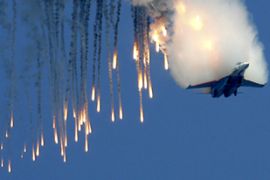Russia withdraws from arms treaty
Moscow pulls out of treaty that curtailed its ability to station troops and weapons.

Nato members said they “deeply regret” the decision.
“Nato allies deeply regret that the Russian Federation has proceeded with its intention to unilaterally ‘suspend’ implementation of CFE Treaty obligations,” the organisation said in a statement.
“Nato allies… want to resolve the current impasse and preserve the benefits of this landmark treaty. They have therefore chosen not to respond in kind at this stage.”
It said Nato members would meet treaty obligations regarding exchange of military information at a scheduled meeting in Vienna on Friday which Russia has said it will not attend.
Restoring military might
Signed in 1990 and modified in 1999, the CFE places precise limits on the stationing of troops and heavy weapons from the Atlantic coast to Russia’s Ural mountains.
Vladimir Putin, Russia’s president, who has made a priority of restoring Russian military might, signed a decree ordering Moscow’s suspension of the treaty last month.
The foreign ministry said that Russia was no longer “constrained by the limitations placed on arms deployments on its flanks”.
However, it said: “We have no current plans to accumulate massive armaments on our neighbours’ borders.”
In theory, Russia can return to the treaty at anytime, but analysts say that is unlikely, given mounting East-West distrust.
Rising tensions
The demise of the CFE comes on top of tensions around US plans to install a missile-defence shield in Nato members Poland and the Czech Republic.
Russia has also threatened to leave another major treaty, the Intermediate Range Nuclear Forces treaty.
At the heart of Russia’s complaints regarding the CFE is Nato’s failure to ratify the amended 1999 version of the treaty, taking into account the huge changes wrought by the 1991 collapse of the Soviet Union.
Nato countries say they cannot ratify the 1999 version because Russian troop presence in the ex-Soviet states of Georgia and Moldova violates the treaty, a charge Moscow rejects.
In addition, Moscow has been pushing for changes to CFE limits on moving troops to the European western flank of the vast country.
Anatoly Antonov, a director at the foreign ministry, said: “Imagine that President Bush cannot move his forces from California to the New York region. It’s ridiculous.”
Observers said the long list of problems made the CFE unlikely to get back on track.
Pavel Felgenhauer, a military analyst, said: “The treaty is dead.”
“It is practically inevitable that Russia will begin moving weapons west, primarily to borders of Baltic states.”